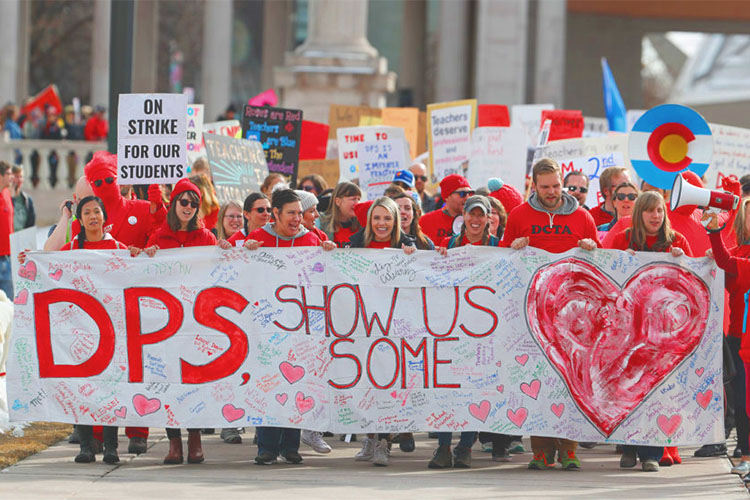
The district-wide walkout provided Denver teachers with a near 12% base pay raise. photo by David Zalubowski
February 11th marks five years since Denver teachers left their classrooms and fought against their district.
Between annual marches, organized walkouts, and even worldwide protests for a call-to-action, freedom of assembly is a regularly executed right within society. For the Thomas Jefferson community, the most prominent strike to affect regular school business took place on February 11th, 2019, when Denver’s first teachers’ strike in 25 years began with a district-wide walkout.
Organized by the Denver Classroom Teachers Association (DCTA), educators across Denver Public Schools initiated a district-wide walkout meant to draw attention from the district to their movement. The association’s demand was clear: they wanted an average 11.7% increase in their base salary to cope with inflation. Rob Gould, the union’s lead negotiator at the time commented that the teachers felt like they “had to use the last tool in [the] tool chest to get [the district] to listen, it’s important that DPS sees and knows and understands what it’s like not to have teachers in the classroom.”
Negotiations stretched for 15 months, including a 20-hour marathon session after the walkout commenced, before the provisional agreement was reached with the DCTA. Educators left their classrooms on a Monday, and after only a little less than a week, they came to a tentative agreement at dawn on Valentine’s Day. Amber Wilson, the union secretary at the time of the strike, recalls the long hours and open bargaining. Similarly, Amy Kalinchuk, TJ’s strike captain, remembers the mentality in the bargaining room, how teachers had thumbs up and thumbs down paddles to convey what they did and didn’t agree with. “We couldn’t yell, it was a library basement. We snapped to the things we liked, we had to make known what we believed was and wasn’t okay to the respective bargaining teams.” Both union members echoed the public nature of the negotiations. Allowed under the Sunshine Law, generally requiring any state or local governmental body to discuss business publically, and permitted under CORA – a law that requires most public records be available to the public.
This landmark agreement introduced a system of steps that allowed teachers to gradually increase their pay. The much-criticized ‘ProComp’ system was replaced, and educators could now receive raises based on performance and years of teaching experience. In accordance with the raise, the Denver School Leaders Association, or DSLA, also gained their own similar perks by extension. Assistant Principal Andrew Skari told the TJ Journal that while administrators are in a different union, they still reaped some of the benefits of the DPS strike. “Usually, whenever there’s gains for the teachers, we’re next. And we were,” Skari explained.
Skari also noted that the teachers strike helped spearhead the effort for administrators to form their own labor organization, which resulted in Denver’s first school administrators union. “At the time it took place [we] were not allowed to participate in the strike but [we] understood and supported what [our] teachers were trying to accomplish.” When teachers have the support and resources they need, students always benefit.
AP Government and Civics teacher James Stephenson recalled, “[Admin] grouped students together with two different staff members to watch them, leaving the students with a lesson plan that wasn’t worth a grade, really just to be there.” Skari echoed this sentiment, stating “[we] did the best [we] could to implement the curriculum provided by the district but it was far from effective. Students saw it for what it was, which was busy work, and didn’t take it seriously.” When it comes down to it there is no replacement for the expertise of the faculty – a crucial point the DCTA aimed to emphasize. Anyone working downtown in DPS buildings who had valid teaching licenses were sent to schools across the district to fill in the spots of striking teachers. The walkout put a major hold on learning and regular school business, according to Kalinchuk. “Denver is a major city, so over 3,000 teachers walking off the job is national news.” On the picket line, Kalinchuk recalls taking “strike attendance” in order to report the most accurate numbers to build up the already heavy pressure. “[We] had cards handed out to anyone that wanted to talk to the press that day, [we] gave them talking points to really nail in.”
February 11th marked the five year anniversary of the strike, and teachers are still reaping the benefits. Skari affirmed that he now knows what he will make ten years from now, and can “actually plan out [his] life, college savings for [his] kid, and retirement,” thanks to the DCTA’s walkout. According to Skari, “if [unions] fight, and they negotiate for rights, it’s going to be better for everyone else.” From the sounds of it, it appears that if Denver educators ever need to strike again, TJ’s administration intends to back them all the way.